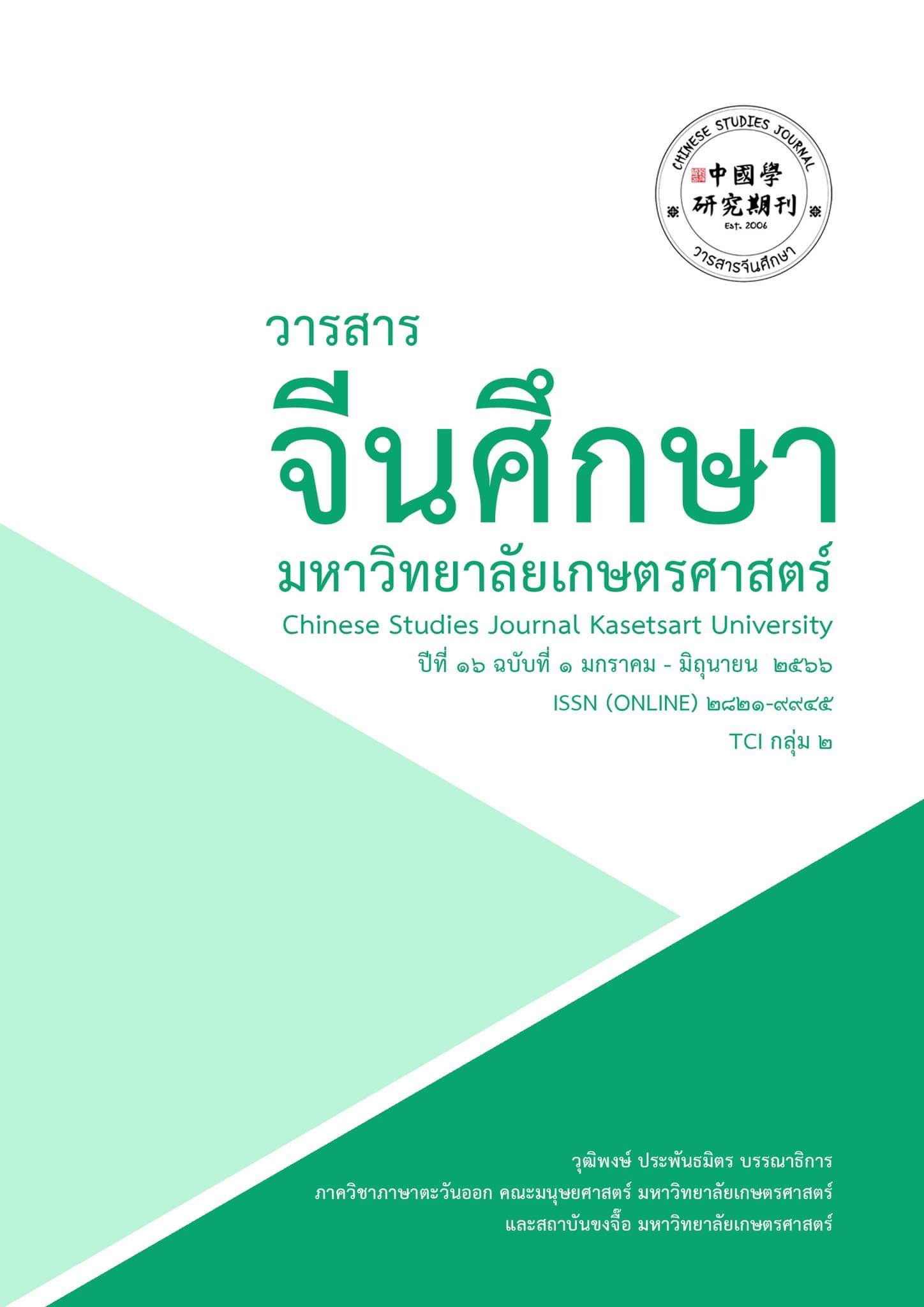A Study of the Cultural differences between the North and the South of China in the Food Essay Collection “Taste of the World” การศึกษาความแตกต่างด้านวัฒนธรรมระหว่างภาคเหนือและภาคใต้ของจีนที่สะท้อนผ่านหนังสือ รวมบทความด้านอาหาร “Test of the World”
Main Article Content
Abstract
Wang Zengqi, a well-known Chinese writer, was born in Gao You, a water town in the south of the Yangtze River, and later moved to Beijing for work. His life journey has been through scenery and characteristics of both north and south part of China. And he has almost tasted the majority of food of the two places.,knowing very well the cultural differences between the south and the north. This article analyzes the cultural descriptions of northern and southern China, especially Jiangsu and Beijing, in Wang Zengqi's collection of gourmet essays "The Taste of the World".The study also discusses the dialects, customs, food culture, living habits and differences in ideology and cultural characteristics from the north to south. This research specifically sorts out the different cognition ,names and cooking practices of food ingredients, in the north and south regions contained in Wang’s book "The Taste of the World". The finding points out there are more direct and pragmatic language characteristics regarding foods of the north,while the south is more metaphorical.Cultural customs and dispositional thinking in these two places embodied in Wang’s food literature also vary significantly.Southerners are likely to be shrewd and particular, while northerners are hearty and bold.
Article Details

This work is licensed under a Creative Commons Attribution-NonCommercial-NoDerivatives 4.0 International License.
ผลงานทางวิชาการที่ลงตีพิมพ์ในวารสารจีนศึกษา มหาวิทยาลัยเกษตรศาสตร์ เป็นลิขสิทธิ์ของผู้เขียนหรือผู้แปลผลงานนั้น หากนำลงในวารสารจีนศึกษาเป็นครั้งแรก เจ้าของผลงานสามารถนำไปตีพิมพ์ซ้ำในวารสารหรือหนังสืออื่นได้โดยมิต้องแจ้งให้ทราบล่วงหน้า แต่หากผลงานที่ได้รับพิจารณานำลงในวารสารจีนศึกษา เป็นผลงานที่เคยตีพิมพ์ที่อื่นมาก่อนเจ้าของผลงานต้องจัดการเรื่องปัญหาลิขสิทธิ์กับแหล่งพิมพ์แรกเอง หากเกิดปัญหาทางกฎหมาย ถือว่าไม่อยู่ในความรับผิดชอบของวารสารจีนศึกษา มหาวิทยาลัยเกษตรศาสตร์ ทั้งนี้ ความคิดเห็นต่างๆ ในบทความเป็นความคิดเห็นส่วนตัวของผู้เขียน ไม่เกี่ยวกับกองบรรณาธิการวารสารจีนศึกษา มหาวิทยาลัยเกษตรศาสตร์
References
张相文.2013. 新撰地文学. 湖南:岳麓书社。
史红梅.2009. 地理教学中我国地域饮食文化差异研究。
马平发.2010. 试析地理环境对我国南北饮食文化差异的影响. 凯里学院学报.Vol.28:128-132.
翟音.2015. 中国南、北方彩色剪纸的色彩研究. 浙江:浙江理工大学硕士论文。
张岱年、方克立. 2004. 中国文化概论.北京:北京师范大学出版社。
唐晓峰. 2018. 南北差异,南方为何多方. 江苏智库网. http://www.jsthinktank.com/xhrirwzk/yuedu/201804/t20180413_5287483.shtml。
叶邓军、唐礼勇.2015. 关于我国南北地区地域性刻板印象的研究.品牌.Vol.05: 199。
马真,刘福智.2018. 通过中国古典园林透视南北方文化差异.住宅与房地产. Vol.30:235。
苏北. 2012. 忆•读汪曾祺. 湖南:安徽文艺出版社。
王菲.2012. 论汪曾祺小说的民问情结.山东大学学报.Vol.04:143-146。
李阳萃. 2011.微博投票引发豆腐脑甜咸之争. 新浪新闻.http://news.sina.com.cn/c/2011-06-12/123322627250.shtml。
何玲.2013. 浅析中国文化之南北方差异.金田.Vol.07: 292。
周怡.2021. 文化差异与地理环境.地质地理网.https://www.enggeo.org/position_1138。
王丹妮.2016. 中国南北方步行街雕塑对比研究.吉林:吉林大学硕士学位论文。
班澜.2002. 中国南北方岩画的审美特征比较.内蒙古大学学报.Vol.34:77-84。
王心怡.2013. 浅谈中国南北方汉族民族舞蹈.各抒己见.Vol.11:83。
王璐. 2013. 中国南北方民间音乐律制对比研究.北京:中央音乐学院硕士学位论文。
梁博.2019.中国南北方文化差异全方位比较. https://www.163.com/dy/article/EI9B7L000511RUAQ.html。
左馥.2012. 中国文化与南方 北方饮食类词语的相互影响. 语言文学Vol.05:116。
孙嘉明、王勋.2006. 全球社会学: 跨国界现象的分析. 北京:清华大学出版社。
薇酱.2020. 从《诗经》和《楚辞》中看南北文学的特征.https://www.163.com/dy/article/FFL37DJK0545B01O.html


